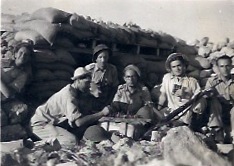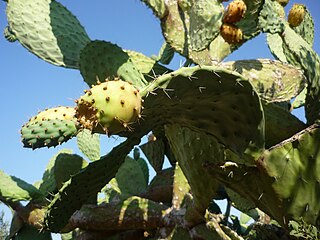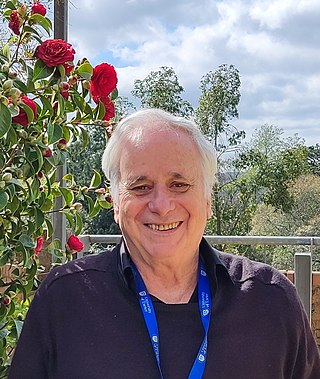
The 1948 Arab–Israeli War, also known as the First Arab–Israeli War, followed the civil war in Mandatory Palestine as the second and final stage of the 1948 Palestine war. It formally began following the end of the British Mandate for Palestine at midnight on 14 May 1948; the Israeli Declaration of Independence had been issued earlier that day, and a military coalition of Arab states entered the territory of Mandatory Palestine in the morning of 15 May.

Ashkelon or Ashqelon is a coastal city in the Southern District of Israel on the Mediterranean coast, 50 kilometres (30 mi) south of Tel Aviv, and 13 kilometres (8 mi) north of the border with the Gaza Strip.

Golda Meir was an Israeli politician who served as the fourth prime minister of Israel from 1969 to 1974. She was Israel's first and only female head of government and the first female head of government in the Middle East.

Killings and massacres during the 1948 Palestine war resulted in the deaths of hundreds of civilians and unarmed soldiers.

The Bene Israel, also referred to as the "Shanivar Teli" or "Native Jew" caste, are a community of Jews in India. It has been suggested that they are the descendants of one of the Ten Lost Tribes via their ancestors who had settled there centuries ago. Starting in the second half of the 18th century, after they were taught about normative Sephardi Judaism, they migrated from villages in the Konkan region where they had previously lived to nearby cities throughout British India—primarily to Mumbai where their first synagogue opened in 1796 but also to Pune, Ahmedabad, and Karachi, where they gained prominent positions within the British colonial government and the Indian Army.

Avi Arad is an Israeli-American film producer who became the CEO of the company Toy Biz in the 1990s and soon afterward became the chief creative officer of Marvel Entertainment, and the chairman, CEO, and founder of Marvel Studios. Since then, he has produced a wide array of live-action, animated, and television comic book adaptations including Spider-Man: Into the Spider-Verse, the 2018 Academy Award winner for Best Animated Feature.

A flip book, flipbook, flicker book, or kineograph is a booklet with a series of images that very gradually change from one page to the next, so that when the pages are viewed in quick succession, the images appear to animate by simulating motion or some other change. Often, flip books are illustrated books for children, but may also be geared toward adults and employ a series of photographs rather than drawings. Flip books are not always separate books, but may appear as an added feature in ordinary books or magazines, frequently using the page corners. Software packages and websites are also available that convert digital video files into custom-made flip books.

A sabra or tzabar is a modern Hebrew term that defines any Jew born in Israel. The term came into widespread use in the 1930s to refer to a Jew who had been born in Israel, including the British Mandate of Palestine and Ottoman Palestine; cf. New Yishuv & Old Yishuv, though it may have appeared earlier. Since the establishment of the State of Israel in 1948, Israelis have used the word to refer to a Jew born anywhere in the Land of Israel.

Ilan Pappé is an Israeli historian, political scientist and former politician. He is a professor with the College of Social Sciences and International Studies at the University of Exeter in the United Kingdom, director of the university's European Centre for Palestine Studies, and co-director of the Exeter Centre for Ethno-Political Studies.

The Institute for Palestine Studies (IPS) is the oldest independent nonprofit public service research institute in the Arab world. It was established and incorporated in Beirut, Lebanon, in 1963 and has since served as a model for other such institutes in the region. It is the only institute in the world solely concerned with analyzing and documenting Palestinian affairs and the Arab–Israeli conflict. It also publishes scholarly journals and has published over 600 books, monographs, and documentary collections in English, Arabic and French—as well as its renowned quarterly academic journals: Journal of Palestine Studies, Jerusalem Quarterly, and Majallat al-Dirasat al-Filistiniyyah. IPS's Library in Beirut is the largest in the Arab world specializing in Palestinian affairs, the Arab–Israeli conflict, and Judaica.
Middle Eastern cinema collectively refers to the film industries of West Asia and part of North Africa. By definition, it encompasses the film industries of Egypt, Iran, Bahrain, Iraq, Israel, Jordan, Kuwait, Lebanon, Palestine, Oman, Qatar, Saudi Arabia, Syria, United Arab Emirates, and Yemen. As such, the film industries of these countries are also part of the cinema of Asia, or in the case of Egypt, Africa.

Cinema of Israel refers to film production in Israel since its founding in 1948. Most Israeli films are produced in Hebrew, but there are productions in other languages such as Arabic and English. Israel has been nominated for more Academy Awards for Best Foreign Language Film than any other country in the Middle East.

Eilabun is an Arab Christian village located in the Beit Netofa Valley around 15 kilometres south-west of Safed in northern Galilee between Nazareth and the Sea of Galilee. It had a population of 5,812 in 2021, which is predominantly Christian (70.5%). In 1973, Eilabun was granted local council status by the Israeli government.
The Eilabun massacre was committed by soldiers of Israel Defense Forces during Operation Hiram on 30 October 1948. A total of 14 men from the Arab Christian village of Eilabun (Eilaboun) were killed, 12 of them executed by the Israeli forces after the village had surrendered. The remaining villagers were expelled to Lebanon, living as refugees for some months before being allowed to return in 1949 as part of an agreement between the state of Israel and Archbishop Maximos V Hakim.

The Tantura massacre took place on the night of 22–23 May 1948 during the 1948 Arab–Israeli War. Around 40–200 Palestinian Arab villagers from Tantura were massacred by the Alexandroni Brigade, which was part of what became the Israeli Defense Force. The massacre occurred following Tantura's surrender, a village of roughly 1,500 people in 1945 located near Haifa. The victims were buried in a mass grave, which today serves as a car park for the nearby Tel Dor beach.

In 1948, more than 700000 Palestinian Arabs – about half of prewar Mandatory Palestine's Arab population – fled from their homes or were expelled by Zionist militias and, later, the Israeli army during the 1948 Palestine war, following the Partition Plan for Palestine. The expulsion and flight was a central component of the fracturing, dispossession, and displacement of Palestinian society, known as the Nakba. Dozens of massacres were conducted by Israeli military forces and between 400 and 600 Palestinian villages were destroyed. Village wells were poisoned in a biological warfare programme and properties were looted to prevent Palestinian refugees from returning. Other sites were subject to Hebraization of Palestinian place names. These activities were not necessarily limited to the year 1948.

The 1948 Palestine war was fought in the territory of what had been, at the start of the war, British-ruled Mandatory Palestine. It is known in Israel as the War of Independence and in Arabic as a central component of the Nakba. It is the first war of the Israeli–Palestinian conflict and the broader Arab–Israeli conflict. During the war, the British terminated the Mandate and withdrew, ending a period of rule which had begun in 1917, during the First World War. Beforehand, the area had been part of the Ottoman Empire. In May 1948, the State of Israel was established by the Jewish Yishuv, its creation having been declared on the last day of the Mandate. During the war, around 700,000 Palestinian Arabs were displaced.
The following events occurred in October 1948:
The Nakba is the violent displacement and dispossession of the Palestinian people, along with the destruction of their society, culture, identity, political rights, and national aspirations. The term is used to describe the events that took place during the 1948 Palestine war, as well as the ongoing persecution and displacement of Palestinians by Israel throughout the Palestinian territories.















